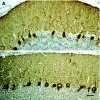Protein kinase Cgamma autoimmunity in paraneoplastic cerebellar degeneration and non-small-cell lung cancer
- PMID: 16801349
- PMCID: PMC2077410
- DOI: 10.1136/jnnp.2006.097188
Protein kinase Cgamma autoimmunity in paraneoplastic cerebellar degeneration and non-small-cell lung cancer
Abstract
Background: The clinical and immunological profiles of patients with paraneoplastic cerebellar degeneration (PCD) and non-small-cell lung cancer (NSCLC) are not well known.
Objective: To review the clinical and immunological features of patients with PCD, NSCLC and without well-characterised onconeural antibodies.
Methods: The clinical features of nine patients with the diagnosis of classical PCD and NSCLC, included in our archives, were retrospectively reviewed. The presence of antibodies to cerebellar components was determined by immunohistochemistry and immunoblot of rat cerebellum. A cDNA library of human cerebellum was screened with the positive sera to identify the antigen.
Results: Nine patients with PCD and NSCLC were identified. Six patients were men, and the median age at diagnosis of PCD was 63 (range 47-73) years. PCD was completely reversed in two patients, and partially in one, after treatment of the tumour. The serum of one of the patients with PCD showed a unique reactivity with Purkinje cells. The screening of a cerebellar-expression library resulted in the isolation of protein kinase Cgamma (PKCgamma). PKCgamma immunoreactivity was not observed in the serum of 170 patients with non-paraneoplastic neurological syndromes, 27 patients with PCD, no onconeural antibodies and small-cell lung cancer, and 52 patients with NSCLC without paraneoplastic neurological syndromes. The NSCLC from 11 patients without PCD did not express PKCgamma at either the RNA or protein level. However, many cells of the NSCLC of the patient with PKCgamma antibodies expressed PKCgamma.
Conclusion: PCD occurs in patients with NSCLC without typical onconeural antibodies and is associated with immune reactions against key proteins of the Purkinje cells.
Conflict of interest statement
Competing interests: None.
Comment in
-
Understanding the physiopathology of paraneoplastic and genetic cerebellar ataxia.J Neurol Neurosurg Psychiatry. 2006 Dec;77(12):1299-300. doi: 10.1136/jnnp.2006.100594. J Neurol Neurosurg Psychiatry. 2006. PMID: 17110741 Free PMC article.
References
-
- Posner J B. Paraneoplastic syndromes. In: Neurologic complications of cancer, Philadelphia FA Davis Company, 1995353–385.
Publication types
MeSH terms
Substances
Grants and funding
LinkOut - more resources
Full Text Sources
Medical



